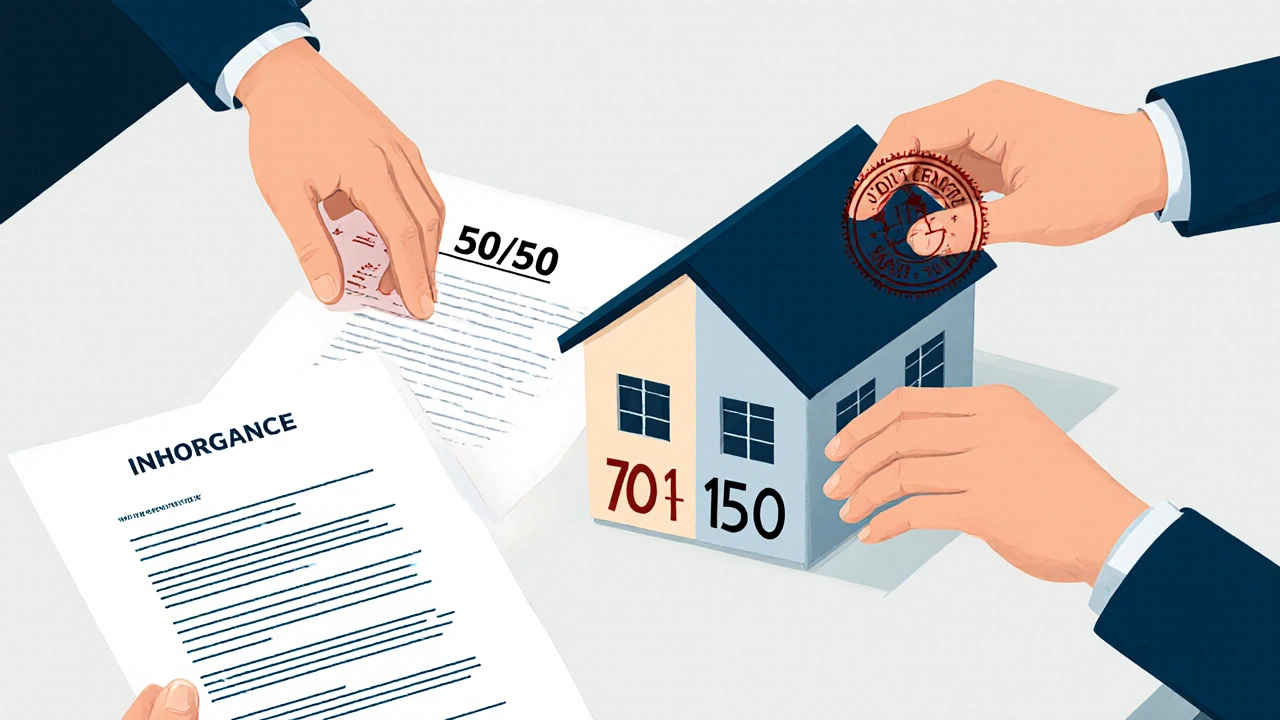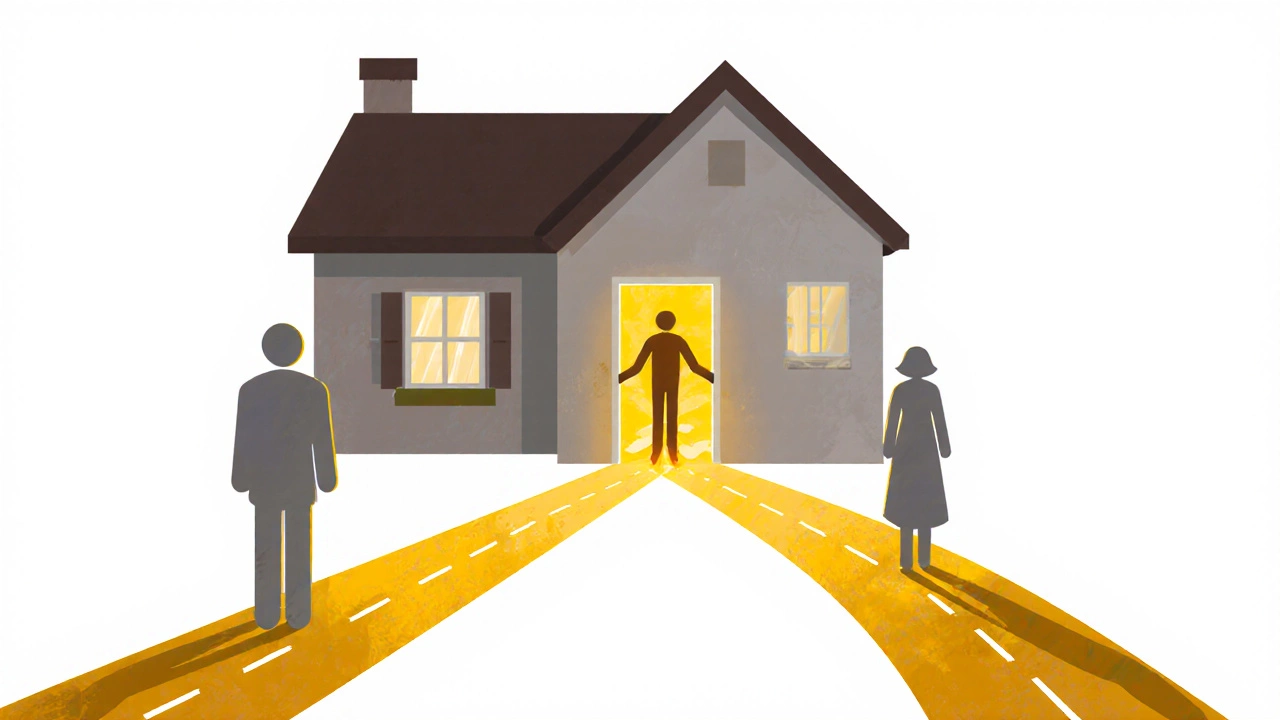New Zealand Property Ownership Calculator
Calculate Property Ownership Outcomes
See what happens to your home if one partner dies under different ownership structures in New Zealand.
When a husband and wife buy a home together in New Zealand, how they own it isn’t just a formality-it affects everything from what happens if one passes away, to who gets the house in a separation, and even how taxes are handled. Many couples assume that because they’re married, the property is automatically shared 50/50. That’s not true. The law doesn’t automatically split ownership just because you tied the knot. How you actually own the property depends on how you register it with Land Information New Zealand (LINZ).
Three Ways Couples Own Property Together
In New Zealand, married or de facto couples can hold property in three main ways: as joint tenants, as tenants in common, or in one person’s name only. Each has very different legal consequences.
Joint tenancy is the most common choice for married couples. If you own as joint tenants, you both own the whole property together. If one person dies, their share doesn’t go through their will-it automatically passes to the surviving partner. This happens no matter what the will says. It’s simple, fast, and avoids probate. Most couples choose this because it feels fair and secure.
Tenants in common means each person owns a specific share-usually 50/50, but it can be 70/30 or any split you agree on. If one partner dies, their share goes to whoever they named in their will. This is useful if you’ve contributed different amounts to the deposit, or if you have children from a previous relationship and want to leave your share to them. It’s also the only way to own unequal shares legally.
One person owns it outright is less common for couples buying together, but it happens. Maybe one partner has better credit, or the other has existing debt that could affect the mortgage. But if the property is in one name only, the other partner has no automatic legal claim to it-even if they paid half the mortgage or did all the renovations. That can be risky.
What Happens If You Separate?
Marriage doesn’t automatically mean equal ownership, but under the Property (Relationships) Act 1976, it does mean equal sharing of relationship property when you split up. This applies whether you’re married or in a de facto relationship of three years or more.
Relationship property includes the family home, even if it’s in one person’s name. It also includes cars, furniture, savings, and even some inheritances if they were used to buy the house. After separation, the law says this property should be split 50/50, unless there’s a written agreement saying otherwise.
But here’s the catch: the law doesn’t care how the property is registered. Even if you own as tenants in common with a 90/10 split, the court can still order a 50/50 division if it’s relationship property. The registration tells you who gets it if one dies. The law tells you who gets it if you split up.
What About Inheritance or Gifts?
If one partner receives a gift or inheritance-say, $200,000 from a parent to put toward the house-that money becomes separate property. It doesn’t automatically turn into relationship property just because you used it to buy a home.
But if you mix it in-like putting the inheritance into a joint account or using it to pay the mortgage-then it can become relationship property. To keep it separate, you need to prove where it came from. Keep bank statements. Keep letters from the person who gave it. Don’t commingle it with shared funds.
Some couples sign a contracting out agreement (also called a prenup) to protect assets. This is a legally binding document that says what each person owns before and during the relationship. It’s not romantic to talk about, but it’s practical. About 1 in 5 couples in New Zealand have one, especially if they own businesses, have kids from prior relationships, or have significant assets.
What If One Partner Dies?
If you own as joint tenants, the surviving partner gets the whole property automatically. No paperwork. No delays. No court. That’s why so many couples choose this.
If you own as tenants in common, the deceased’s share goes to their estate. That means it follows their will. If they didn’t leave a will, the law divides it among their next of kin-possibly their children, parents, or siblings. That could mean the surviving spouse has to buy out the other heirs, or even sell the house.
Let’s say John and Maria own as tenants in common, 50/50. John dies without a will. His share goes to his daughter from a previous marriage. Maria still owns her half, but now she has to deal with a co-owner she never chose. She might need to sell to get full control. Or pay her stepdaughter for her share. That’s not what most people expect when they marry.

How to Change How You Own the Property
It’s not set in stone. You can change how you own the property at any time. If you’re joint tenants and want to split your shares, you can sever the joint tenancy and become tenants in common. You need to fill out a form with LINZ and pay a small fee. Once you do, your shares are fixed.
Or if you own as tenants in common and want to simplify things after your kids grow up, you can switch to joint tenancy. Again, LINZ handles the paperwork. But you both must agree. One person can’t change it alone.
Many couples don’t think about this until something happens-a death, a breakup, a new child. But reviewing your ownership type every few years, especially after big life events, is smart.
What About Mortgage and Rates?
Who pays the mortgage doesn’t change ownership. You can both be on the mortgage, even if only one person is on the title. Or one person can be on the title but both on the mortgage. Banks don’t care how you split ownership-they care about who can repay the loan.
But rates and council charges? Those go to the legal owner. If only one person is on the title, they’re the one who gets the bill. If you’re tenants in common, both names might appear on the rates notice, depending on how LINZ has it set up.
It’s a good idea to have a written agreement about who pays what-even if you’re married. It avoids fights later. And if you’re splitting up, it makes dividing costs much easier.
Real-Life Example: The Auckland Couple Who Didn’t Know
Emma and Liam bought a house in Onehunga in 2018. Emma’s parents gave them $100,000 for the deposit. They registered as joint tenants. In 2023, Liam passed away suddenly. Emma expected to keep the house. She did-but she also found out that Liam’s sister, who he hadn’t spoken to in 10 years, was now legally entitled to his share of his superannuation and car, because his will hadn’t been updated. The house was fine-thanks to joint tenancy-but the rest of his estate became messy.
Emma didn’t know that joint tenancy only protected the house. She didn’t know to update Liam’s will. That’s a common blind spot.
Now, Emma keeps copies of both the title and the will. She talks to her lawyer every two years. She’s not worried anymore.

What Should You Do Right Now?
If you’re buying a home with your partner:
- Ask your lawyer or conveyancer: How are we registering the title?
- Decide if you want joint tenancy or tenants in common-and why.
- If you’re putting in different amounts, go with tenants in common and document your shares.
- Update your wills to match how you own the property.
- Keep proof of any gifts or inheritances used for the house.
- Consider a contracting out agreement if you have assets you want to protect.
Don’t assume marriage equals equal ownership. The law protects your rights when you split up-but it doesn’t protect your wishes when someone dies. You need to set that up yourself.
FAQ
Can my spouse sell our home without my permission?
No. If you’re married or in a de facto relationship, both partners must sign to sell the family home-even if only one name is on the title. The law requires both parties to consent. This protects the non-owning spouse from being pushed out of the home.
Does owning as joint tenants mean we both own 50%?
Not exactly. With joint tenancy, you both own the whole property equally, but you don’t have separate 50% shares. It’s one ownership shared between two people. If one dies, the other gets 100%. With tenants in common, you each have a defined share, like 60/40, and that share can be passed on.
What if we’re not married but living together?
If you’ve lived together for more than three years, the Property (Relationships) Act still applies. You’re treated the same as married couples when it comes to dividing property after separation. Ownership type (joint tenancy or tenants in common) still controls what happens if one dies.
Can I change from joint tenants to tenants in common after buying?
Yes. You can sever the joint tenancy at any time by filing a form with Land Information New Zealand. Both parties must sign, and there’s a small fee. Once changed, you each own a specific share that can be left in your will.
Do I need a lawyer to change how we own the property?
You don’t legally need one, but it’s strongly recommended. A lawyer can help you understand the tax, inheritance, and relationship property implications. They can also draft the right documents to make sure your wishes are clear and legally enforceable.
Next Steps
Check your current title. Go to the LINZ website and request a copy of your certificate of title-it’s free. See how your names are listed. If you’re unsure what it means, take it to a conveyancer or property lawyer. Ask: "Is this joint tenancy or tenants in common?" and "Does this match what I want to happen if one of us dies?"
If you’re buying now, don’t sign anything without understanding the ownership type. It’s one of the most important decisions you’ll make about your home-more important than the color of the kitchen or the size of the backyard.
